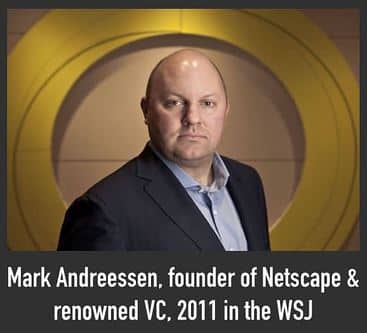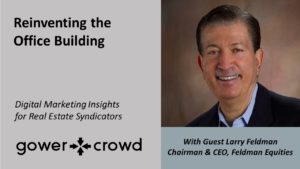FREE TRAINING
What is Real Estate Crowdfunding?
Learn how to build wealth and earn passive income in real estate while someone else does all the work.
208 Alex Rampell, Andreessen Horowitz

Alex Rampell, General Partner
Alex Rampell is a General Partner at Andreessen Horowitz where he leads the firms fintech investments and serves on the boards of Branch, PeerStreet, Point, and Quantopian. Prior to joining a16z, he was the CEO and cofounder of TrialPay, a leading transactional advertising and payments company serving digital goods and e-commerce clients such as Facebook, Zynga, and Gap, with 100 employees and over $300M in revenue. TrialPay was acquired by Visa in 2015. TrialPay also spun out another company, Yub, the first offline affiliate network, where Alex simultaneously served as CEO through its acquisition in late 2013 by Coupons.com.

Conspiracy Against the Lady
Real estate is not just a financial services play but it is the largest asset class pretty much in the world, and just everything involving a transaction for real estate is subject to change. Most particularly it is the intermediary person who has, in most industries, been removed. The same thing is happening for real estate as well though real estate is probably the hardest one to change partially because the frequency, at least for residential real estate.
Every industry is a conspiracy against the lady. In the case of real estate, your average consumer might buy a house every seven to ten years so transactions are not so frequent where consumers are up in arms about getting better service or better functionality. Plus there are entrenched forces within real estate where you have this idea of concentrated benefit and diffuse harm. This apparent when you ponder why it is that real estate fees and commissions on residential real estate transactions are still stable at between 5 and 6 percent. That seems odd when there's so much competition and when there are so many different technology platforms that would drive that potentially lower.
But part of it is this idea that there is very concentrated advantage to real estate agents who benefit from that fee enormously and that that is their livelihood, and where there is somewhat diffuse harm in terms of consumers who would prefer not to pay such high fees. But if it is a once every 10 year transaction and then once every 10 year fee consumers do not actually care enough to drive change in any way themselves. It is harder to affect change in industries that have those concentrated benefits, diffuse harm and very episodic transactions as opposed to very high frequency transactions.
Leaders of The Crowd
Conversations with Crowdfunding Visionaries and How Real Estate Stole the Show
Discover how laws that gave us crowdfunding were solely meant to finance small companies and yet inadvertently opened the doors to allow you to invest in real estate like never before.
Read the book and listen to the actual conversations.
Fintech
Fintech is the merger between finance and technology, though the skeptical view of fintech would be that it is much more Fin than it is Tech. In general, fintech is just technology enabled businesses that are trying to do something around finance. We have to think about solutions where banks, for example have branches that we no longer need, and a lot of old fashioned in-person communication that is also anachronistic for mundane transactions. We look to the types of businesses that we can build, because of these things. Essentially, fintech is creating a marketplace for all things around money and for which there are four different categories.
- The first is relatively speaking things that banks do. Banks take deposits, make loans, send money, and there are some things like payments that are an amalgamation of those.
- The second category is a very broad range of things that banks do not do, for example payday loans or check cashing. In this category also falls Point.com because Point allows you to sell part of the equity in your home which is something banks do not allow you to do.
- Category 3 is insurance. If you can do it with better underwriting data because everybody is wearing a Fitbit, or you can do it with better underwriting data for cars because you can measure on your cell phone how fast you are driving.
- The fourth category is just in developing effective investment management. So things like robo advisors and the like.
How to Fund Your Deals
7 Steps to Raising Equity Online
Business not Tech
While today we might apply the epithet ‘fintech’ to a company, in 20 years you are not going to think of it this way, but rather you will think about it as your bank or as your insurance company or your retirement account. Only it will look very different than those types of companies look today.
Similarly, you might think of Point or PeerStreet as being technology enabled investment platforms. At their core they are simply technology businesses; there is no branch, there's no retail establishment. It is just a website where you go and it is a marketplace where transactions happen. You can think of PeerStreet as being like eBay for hard money loans, and of Point as the eBay for equity shares in residential real estate.
The 1,000x Return-On-Investment Paradigm
As venture capitalists, when we look at opportunities what we think about is the team, it is very, very good, and is the opportunity enormous. In the case of Point it is about rethinking this idea of how does residential real estate work and that it does not make sense to only have two methods for dwelling. The first method is where one rents and is where one owns zero percent of the residence. The second is called owning in which case one will eventually own 100 percent of the residence by using a bank as a 30 year crutch. But why is that? Why can someone not own 92 percent of their home and sell the other 8 percent to somebody else. We invested in Point because we thought it presented a very interesting opportunity where technology had come a long way and could resolve this anachronism.
So figuring out how to finance the loans or the equity slugs that you do get to homeowners is a good question for kind of the broader use case of a fintech.
The venture capitalist does not buy the assets that these fintech firms originate. This is an important distinction because the assets that are originated look more like credit instruments that might yield 10 to 15 percent or some cases even more. Getting a 20 percent annual return secured by a real asset might be pretty compelling, but ironically it is not very compelling for venture capital.
The venture capitalist is betting on
managers like those at Point and PeerStreet to yield, every once in a while,
a thousand times return on equity.
PeerStreet
PeerStreet is about people that buy old properties fix them up and then sell them typically within a short term time horizon. So for PeerStreet it could be described as being speculative but in supply constrained markets with low loan to value ratios a strong case can be made that it is not that speculative of an investment.
The main characteristics that make PeerStreet compelling is that they have a unique model. A local private lender may make loans to real estate developers in his vicinity and over time comes to understand what kinds of loans and which borrowers pay back as promised. Once they are paid back, they can make loans again. The problem for the local lender is that they cannot scale their model, but they can scale much more quickly if they could go sell part of the loans that they are originating to a third party – and that is what PeerStreet does.
Very important for PeerStreet, of course, is to avoid adverse selection so the company actually does its own underwriting on top of the underwriting that the local lender has done. In fact, they scaled to over half a billion dollars of loans with no defaults in just their first couple of years.
A compelling aspect of their model is that, normally, intelligence is trapped in humans heads and PeerStreet is kind of the opposite in the sense that they have identified this and are using it to their advantage. They recognize that the local lender understands their market intimately and has their own network of borrowers that they go to. So by utilizing this network of lenders, they are able to force multiply the market.
This is very appealing because your average venture firm might give seven to ten million dollars as an initial investment where it can be very difficult to get the customers and the cool thing about PeerStreet is that they actually they do not have to spend any money getting the end customers because of the relationships they are leveraging with local lenders.
Point
Apart from the product type, the main difference between Point and PeerStreet is the duration of the investment. Point presents a much longer duration product. Point is also an equity product that can lose money if the value of the home decreases, as can PeerStreet, but it is a secured form of equity, backed by a lien on the property.

Andreessen Horowitz
Alex is one of nine general partners at venture capital firm Andreesen Horowitz and they are the ones that make the investment decisions, but in addition there are some 120 other people that work at the firm. Unlike other types of VCs Andreesen Horowitz brings added value to portfolio companies beyond capital infusions.
For example, they provide recruiting support because it is very hard to hire engineers. There is a policy and regulatory affairs team, and another team on communications and marketing. Additionally, every single one of their fintech companies needs debt capital, and in some cases accredited investor capital, so treasury is also an area of support that they have been beefing up.
RELATED PODCASTS
341 Scott Choppin, Founder and CEO of Urban Pacific
Last Updated on September 15, 2021 by Dr. Adam Gower FREE TRAINING What is Real Estate Crowdfunding? Learn how to build wealth and earn passive income in real estate while…
READ MORE >332 Larry Feldman, CEO Feldman Equities
Last Updated on April 17, 2023 by Dr. Adam Gower FREE TRAINING What is Real Estate Crowdfunding? Learn how to build wealth and earn passive income in real estate while…
READ MORE >












